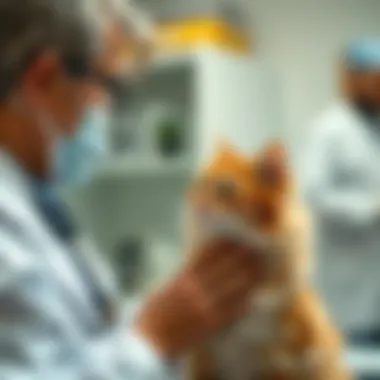Understanding Neutering Costs for Male Cats


Intro
Neutering male cats is a significant decision for cat owners, influenced by various factors that range from financial implications to ethical considerations. The cost of the procedure can vary widely, which might leave potential pet owners scratching their heads. Not only does the price fluctuate based on location and the veterinary clinic chosen, but there’s also a multitude of factors that come into play, including associated health benefits and the broader implications for responsible pet ownership. This article will serve as a guide to navigating the financial aspects of neutering male cats while also shedding light on why this procedure matters beyond mere dollars and cents. By delving into the nitty-gritty of costs and underlying issues, we aim to empower you, the pet owner, in contributing positively to your feline friend's life.
Pet Care Essentials
When considering neutering, you should also take a step back and think about the wider context—your male cat's overall care. Here are several essential aspects of pet ownership to think of:
Daily Nutrition Requirements
A balanced diet plays a crucial role in your cat's health, especially post-neutering. Male cats can be prone to weight gain after the procedure, so choosing high-quality cat food is essential. This diet should include adequate protein, healthy fats, and essential vitamins and minerals. Be sure to consult with your veterinarian about your cat's specific dietary needs, as their requirements may change following neutering.
Exercise and Playtime
Regular exercise is equally important. Cats are natural hunters, and maintaining a stimulating environment can prevent obesity and related health issues. Engage your feline friend in play sessions that mimic hunting behavior, using wand toys or laser pointers to get them moving. This not only helps with physical health but also aids in mental stimulation, reducing boredom-related behaviors.
Grooming Tips
Grooming your cat shouldn’t just be an afterthought. Regular brushing can help manage shedding and reduce hairballs, especially if your cat has a long coat. Moreover, it serves as a great way to bond with your pet. Consider a grooming routine that works for both of you—some cats might even enjoy it!
Health and Wellness Check-ins
Establishing a routine vet check-up is vital in keeping your pet healthy. After neutering, regular health screenings can help catch any potential health issues early. If something feels off, don't hesitate to reach out to your veterinarian.
Epilogue
Prelude to Cat Neutering
Neutering is a significant topic for cat owners, and understanding it is crucial for responsible pet ownership. This section intends to shed light on the concept of cat neutering, its procedure, and the importance of making informed decisions about it.
Cat neutering involves surgical procedures that render male cats incapable of reproducing. This process is not just a matter of convenience; it has lasting impacts on the health and behavior of your feline friend. Among the key benefits, neutering is known to decrease the likelihood of certain health issues and behavioral problems, which can potentially lead to a more harmonious domestic life.
When pet owners explore this topic, they may find themselves weighing a variety of factors. The most pressing among these are financial considerations, health implications, and ethical viewpoints. In a landscape where many are keen on adopting pets but often unprepared for their long-term care, understanding neutering's role becomes doubly important. There’s a certain responsibility that comes with having pets, and being informed can be the distinguishing mark of a good pet owner.
What is Neutering?
At its core, neutering male cats refers to the surgical procedure that removes their testicles. This operation, usually performed under general anesthesia, helps in controlling unwanted pregnancies and can mitigate certain societal problems, such as cat overpopulation. The procedure is relatively quick, typically taking less than an hour depending on the vet and the individual cat's condition. Post-surgery, complications are rare, but some minor side effects can appear, such as tenderness or slight swelling in the surgical area.
Neutering also affects hormones that play a vital role in various bodily functions. By lowering testosterone, the procedure often results in some behavioral changes, which can have significant implications for the owner's experience and the cat's quality of life.
Why Neuter Male Cats?
Choosing to neuter male cats can seem like a daunting decision for some owners, but the upsides often far outweigh the perceived cons. Here are several reasons why this decision is one worth considering:
- Health Benefits: Neutering reduces the risk of certain types of cancers such as testicular cancer and also lowers the chances of prostate issues later in life.
- Behavioral Changes: Many cat owners notice a reduction in aggressive behavior and territorial marking after neutering. Intact males tend to roam further in search of mates, exposing them to injuries and diseases. Neutering often curbs these tendencies, keeping them close to home.
- Population Control: There are millions of stray cats that suffer due to overpopulation. By neutering your male cat, you help reduce the number of unintended litters and contribute to better overall animal welfare.
- Cost Effectiveness: While neutering does involve upfront costs, the long-term savings can be significant. Avoiding unwanted litters or related health issues can save owners costly veterinary bills down the line.
Neutering represents a blend of care, responsibility, and ethical commitment to helping control the feline population. As pet owners evaluate their choices, understanding these various aspects allows for a deeper appreciation of what neutering entails and why it can play a crucial role in the well-being of our furry companions.
"An ounce of prevention is worth a pound of cure." By planning ahead for your cat’s needs, you invest in a happier future for both of you.
Cost Breakdown for Neutering Male Cats
Understanding the cost associated with neutering male cats is crucial for pet owners. It not only allows them to budget appropriately but also helps in weighing the long-term advantages against the initial expense. Neutering can positively impact the health and behavior of male cats, and knowing the costs involved can guide owners in making informed decisions.
Factors Influencing Cost


Determining how much you might pay to neuter your male cat can be a bit of a minefield. Several factors play a role in setting the price. Here are some things to consider:
- Location: Just as real estate varies, so too do veterinary costs across regions. In big cities, for instance, you might find prices through the roof compared to smaller towns. The disparity can sometimes run deeper than the concrete jungle versus a quiet suburb.
- Type of Veterinary Practice: A high-end animal hospital spots a different price point than a low-cost clinic. Specialty practices might charge more due to the advanced equipment and expert staff at their disposal.
- Cat��’s Health: If your cat has pre-existing health conditions, it might add to the complexity of the procedure and subsequently increase costs due to additional tests or precautions.
- Age and Weight: Younger and healthier cats are usually simpler to neuter. Older or overweight cats might require more attention, influencing the price.
- Sedation and Anesthesia: The type of sedation or anesthesia needed can also affect cost. Some procedures may require a more intensive approach, driving costs higher.
Average Prices in Different Regions
It’s essential to have an idea of what neutering typically costs across various neighborhoods. Here's a glance at the landscape:
- In urban areas, you might pay anywhere from $100 to $300, depending on the clinic and its reputation.
- Moving to more suburban settings, the costs may decrease to about $70 to $150.
- If you look a little closer to home—your local shelters or non-profit organizations—they often provide services at reduced rates, sometimes as low as $20 to $50. Though these clinics might have limited availability, their impact is profound for community pet owners.
Pricing does vary widely, so taking time to research local options can lead to significant savings.
Veterinary Clinic Pricing Structures
Understanding the pricing structures of veterinary clinics makes it easier to navigate the financial waters of neutering. Here’s how the pieces typically fit:
- Base Fee: Most clinics will have a standard price for the procedure itself, which will vary based on the factors mentioned earlier.
- Additional Charges: Keep an eye out for any extras such as pre-surgery blood tests, pain medications, or post-operative check-ups, which may not be included in the base fee.
- Promotions & Packages: Many clinics offer promotions, especially during specific months when they encourage spaying and neutering. Finding a clinic that offers package deals might save you some bucks in the long run.
- Payment Plans: Some veterinary practices recognize that not every pet owner can pay upfront. They may offer payment plans that allow costs to be spread out over time, which can ease the pressure on your wallet.
"Taking the time to ask questions and explore different clinics not only helps you understand costs but can also lead you to hidden gems in your area that prioritize your cat's care."
Every pet deserves quality care, and understanding the costs involved can empower you be the best guardian to your furry friend. Pay attention to what each clinic offers and dig a little deeper into their practices—it may lead you to the best service for your cat's needs.
Additional Expenses Related to Neutering
Neutering a male cat is not just a one-off fee at the veterinary clinic; it comes with additional expenses that pet owners must consider. Understanding these costs is crucial for planning and ensuring your cat receives the best possible care. By looking into the extra charges involved, cat owners can get a clearer picture of the complete financial commitment required for this significant procedure.
Pre-operative Assessments
Before the actual neutering surgery, a pre-operative assessment is often necessary. This step plays an important role in ensuring your cat is healthy enough for surgery. A vet will typically conduct a physical exam to check for any underlying health issues that could complicate the procedure.
During this evaluation, additional diagnostics may also be recommended. These can include blood tests to check liver and kidney function or even a urinalysis. While these assessments can add up, they are invaluable for safeguarding your cat's health. It's a common practice to pay anywhere between $50 to $150 for these pre-operative checks, depending on the vet and the complexity of the assessments.
Post-operative Care
After your male cat is neutered, post-operative care is an essential part of the recovery process. This care ensures that your pet heals properly and without complications. Watching for signs like excessive swelling, bleeding, or changes in behavior is necessary to catch any potential issues early. While the vet will give specific instructions for at-home care, costs can unexpectedly arise from medications prescribed to manage pain or prevent infection. Pain relief medications can cost between $20 and $75, depending on what’s prescribed, adding to the overall expense.
Providing a quiet and comfortable environment for your recovering cat might also involve some minor costs. You might need to purchase a cone to prevent them from licking at their stitches, which can set you back another $15 to $30.
Follow-up Visits
Finally, follow-up visits are a crucial part of the neutering journey. These visits allow the veterinarian to check on your cat’s recovery and remove stitches if needed. Missing these appointments can lead to complications or unresolved issues. Usually, these follow-up visits can range from $30 to $100, depending on the clinic.
In summary, when budgeting for neutering your male cat, don’t overlook these additional expenses related to pre-operative assessments, post-operative care, and necessary follow-up visits. The small costs can quickly add up, but they are a vital part of ensuring that your furry friend stays healthy and happy after surgery.
"Taking care of your pet's health goes a long way in enhancing their quality of life."
By planning for these costs in advance, you give your pet the best chance at a smooth recovery and a healthy future.
Comparative Analysis of Neutering Costs
Examining the costs associated with neutering male cats is not just about dollars and cents; it offers pet owners a clearer understanding of their options. Different clinics, whether they be low-cost centers or traditional veterinary practices, come with distinct price points, presenting varied levels of care. This comparative analysis helps highlight the pros and cons of each approach, offering insights that can influence pet owners' decisions.
Pet owners should consider not only the financial aspects but also the quality of care their feline friends will receive. Ultimately, making an informed choice is crucial, as it can affect their cat's long-term well-being.
Low-Cost Clinics vs Traditional Veterinary Practices
Low-cost clinics can be a lifeline for many pet owners battling high costs, although they often operate under a different model compared to traditional veterinary practices. Low-cost options usually focus on volume, performing quick procedures at lower prices, which might seem appealing at first. For instance, clinics like the SPCA or community-based programs frequently offer packages that include neutering for a fraction of the price you'd find at a private veterinarian.


However, it’s important to consider the trade-offs.
- Speed over Comfort: Many of these clinics may prioritize getting through as many surgeries as possible, which could lead to less personalized post-operative care.
- Limited Services: While low-cost clinics often perform the procedure efficiently, they might not provide the same range of services such as pre-surgical blood tests, pain management options, or even post-op follow-ups.
On the other hand, traditional veterinary practices typically include these services and offer a higher level of care. A reputable vet may charge more, but this can ensure that your cat is well taken care of before and after the surgery. With a thorough pre-operative examination, tailored pain management strategies, and close monitoring during recovery, traditional practices provide a comfort level that many owners seek.
Non-profit Organizations and Their Impact
Non-profit organizations play a significant role in bridging the gap between pet owners and affordable veterinary care. Often funded through donations and grants, these organizations strive to reduce the number of stray cats and help pet owners who may find the costs daunting. Programs from places like the Humane Society often include neutering as part of their mission.
The benefits of utilizing non-profit organizations for neutering include:
- Affordability: Many of these organizations offer services at a reduced cost or even free, helping low-income families keep their pets spayed or neutered.
- Community Outreach: They engage with local communities to promote responsible pet ownership, which can positively impact pet overpopulation.
- Additional Resources: Non-profits frequently provide educational resources and support that can help guide owners toward better long-term care, ensuring a balanced approach to pet ownership.
Health Implications of Neutering
Neutering male cats involves more than financial considerations; it also yields substantial health implications. This section aims to unpack the myriad benefits and potential drawbacks associated with this procedure. Understanding the health perspective not only aids in making an informed choice but also emphasizes the long-term impact on feline well-being.
Behavioral Changes Post-Neutering
One of the most noticeable changes in a cat’s demeanor after neutering can be a significant decrease in aggressive behaviors and typical mating instincts. Before neutering, male cats often exhibit roaming tendencies. They may feel an urge to wander far from home in search of potential mates. Post-neutering, however, many owners find that their cats are more content to stay close to home.
- Less Aggressive Behavior: Neutered cats tend to engage less in territorial fights, leading to fewer injuries.
- Reduced Marking: The inclination to spray urine to mark territory diminishes considerably.
While every cat is different, these behavioral shifts can provide a more harmonious living situation for both pet and owner. Reducing mating calls and nights spent prowling can transform a cat’s personality, and, in many cases, this makes them more affectionate towards their families.
Long-term Health Benefits
Neutering does not just affect behavior; it plays a crucial role in the long-term physical health of male cats. Here are several key benefits:
- Reduced Risk of Diseases: Neutering significantly lowers the chances of developing certain types of cancers, including testicular cancer and potentially lethal prostate issues. This alone highlights the importance of the procedure in proactive healthcare.
- Decreased Risk of Feline AIDS: Unneutered cats often engage in fights that can lead to the transmission of various diseases, including feline immunodeficiency virus (FIV). By neutering, you are helping to lower the risk of your cat contracting such illnesses from fighting.
- Longer Life Expectancy: Studies have shown that neutered male cats tend to live longer due to the reduction in health-related issues and risky behaviors associated with mating.
"Neutering not only contributes to behavioral adjustments but also helps prevent several health concerns associated with unaltered male cats."
Ethical Considerations in Neutering
Neutering male cats is not merely a veterinary procedure; it brings with it a plethora of ethical considerations that resonate with cat owners and society alike. Understanding these implications encourages responsible pet ownership and community welfare. The conversation about the ethics of neutering is significant in the wake of rising stray cat populations and the health challenges they face. By unpacking the motivations behind this procedure, one can appreciate its multifaceted nature and why discussions about responsibility, health, and public welfare are crucial.
The Role of Spaying and Neutering in Population Control
Spaying and neutering play a pivotal role in managing feline populations. Each year, countless kittens are born, contributing to overpopulation in shelters and on the streets. Many of these young cats don’t survive, facing illness, starvation, or accidents. By neutering male cats, the chance of unwanted litters drops dramatically.
- Fewer kittens mean less strain on overburdened shelters.
- Reducing local feral cat populations can lead to improved health conditions for those remaining, as it limits the spread of diseases.
- Community dynamics can change when there are fewer stray cats, less fighting among males, and reduced noise from mating behavior.
Overall, neutering is a practical approach to curbing the cycle of overpopulation, thereby promoting a healthier cat community.
Addressing Common Concerns
Concerns often arise regarding the neutering procedure itself and the broader implications of taking such a step. Some of these apprehensions include:
- Health Risks: Many pet owners worry about potential health risks associated with the surgery. While no surgery is without risk, neutering is considered safe. The benefits, including preventing certain diseases and conditions, often outweigh the risks.
- Behavioral Changes: Another common concern is how neutering may change a cat’s personality. In reality, most male cats become less aggressive and territorial post-neutering, making them more affectionate companions.
- Ethical Debate: The ethicality of neutering can sometimes stir debate among cat enthusiasts. While some argue that it interferes with natural processes, striking a balance between nature and humane population control can lead to better outcomes for all.
"Responsible pet ownership involves considering the well-being of both individual pets and the community at large."
In addressing these concerns, education and open dialogue can bridge gaps in understanding, fostering an informed community of pet owners.
In summary, the ethical landscape surrounding neutering male cats is intricately woven into discussions about animal welfare, health, and broader societal responsibilities. Cat owners must weigh these considerations and make informed choices that reflect both their love for their pets and their commitment to responsible care. For more information on the ethics surrounding neutering and its community impacts, resources from reputable sites like Wikipedia or the Humane Society provide valuable insights.


Preparing for the Neutering Procedure
Preparing for your cat's neutering procedure is not just a logistical task; it's a significant step towards responsible pet ownership. As a cat parent, understanding the implications of this process can feel more overwhelming than teaching a toddler how to ride a bike. However, a bit of knowledge and preparation can lead to a smoother experience for both you and your feline companion.
Choosing the Right Clinic
Selecting the right clinic is crucial. Not all veterinary practices are created equal, and doing your homework can make all the difference. You need a place where the staff’s expertise shines and where your cat will feel as comfy as a bug in a rug. Look for clinics with solid reputations in the community, positive reviews from fellow pet owners, and veterinarians who specialize in feline care.
Consider visiting a few clinics to get a feel. Ask questions about their surgical protocols, anesthesia practices, and post-operative care. Also, ensure that the clinic has good sanitation standards; you wouldn't want your cat catching anything unpleasant while they're already in the vulnerable state of surgery.
"Investing time in choosing the right clinic can save you and your cat a world of hassle."
What to Expect on the Day of Surgery
On the day of the procedure, it's normal to feel a bit anxious, much like waiting for your favorite band to take the stage. Here’s a quick rundown of what to expect so you can go in with your head held high.
- Arrival and Check-in: You’ll likely need to arrive early to complete paperwork and have your cat checked in. This is the time to bring any medical records as required by the clinic.
- Pre-operative Instructions: The vet will go over what to expect during the surgery and any medications prescribed for aftercare. These conversations can shed light on crucial aspects such as if your cat should be fasting before the operation.
- Anesthesia: Once it’s time for the procedure, your cat will be given anesthesia. This is where a knowledgeable clinic’s expertise truly matters; ensuring your cat is comfortable and safe is paramount.
- The Waiting Game: You might find yourself sitting in the waiting area, your heart racing a tad, but it’s all part of the process. Duration varies, but neutering is typically a straightforward, quick procedure.
- Post-Op Recovery: After surgery, your cat will need time to wake up from the anesthesia under careful watch. Staff will assist in providing initial post-operative care and will inform you when it’s time to take your fur baby home.
Understanding these steps can transform a daunting day into a manageable experience, allowing you to focus on bringing your beloved pet home after a successful neuter. It's all about setting the stage for a quick recovery and emphasizing the importance of being informed and involved.
Post-neutering Care for Male Cats
Once the decision to neuter a male cat is made, the responsibility of ensuring a smooth recovery falls squarely on the pet owner’s shoulders. Post-neutering care plays a vital role in facilitating recovery and maintaining the cat's long-term health. The initial few days after surgery can be crucial, as cats are often disoriented and uncomfortable. Proper care can significantly influence their healing process.
Signs of Recovery
Monitoring your cat's recovery is essential to catch any complications early. After neutering, your cat should display certain signs of recovery, which may include:
- Eating and Drinking: A healthy appetite is usually one of the first indicators of recovery. While it’s expected that your cat might not eat immediately post-surgery, a return to normal eating habits within 24 hours is a good sign.
- Litter Box Use: Regular bathroom breaks indicate that the cat is comfortable enough to function normally. If your cat is avoiding the litter box, it may signal discomfort or complications.
- Activity Level: While some lethargy is normal right after the procedure, you should observe your cat gradually regaining his energy. If he starts to play or move around lightly within a few days, that's encouraging.
- Wound Condition: Check the sutures or incision site daily for any signs of infection. This includes redness, swelling, or discharge, which can indicate that something is amiss.
It's important to remember that every cat is different, and recovery times can vary. Keeping an eye on these factors helps offer peace of mind, both to the owner and the feline.
When to Contact the Veterinarian
While many signs of healing are typical, certain symptoms should prompt immediate contact with a veterinarian. If your cat exhibits any of the following, it might be time to reach out for professional advice:
- Persistent Vomiting or Diarrhea: If your cat is unable to keep food or water down, or has frequent bouts of diarrhea, these could be signs of a more serious issue.
- Excessive Swelling or Bleeding: A moderate amount of swelling can be expected, but if the area around the incision becomes excessively swollen or exhibits continuous bleeding, don't delay in contacting your vet.
- Refusal to Eat After 24 Hours: If your cat still shows no interest in food after a full day post-surgery, it may indicate something is wrong.
- Abnormal Behavior: If your cat seems more lethargic than usual or is hiding away and unresponsive, these behavioral changes warrant a vet visit.
Ultimately, the goal is to create a comfortable and secure environment for your male cat to recover. Being attuned to his needs and knowing when to seek out help can make all the difference in ensuring a smooth recuperation process.
"A well-cared-for cat is a happy cat, and a happy cat will thrive long after the procedure."
For further resources and insights on post-operative care for your pet, you can visit American Society for the Prevention of Cruelty to Animals or read about it on PetMD.
Closure and Final Thoughts
In the grand tapestry of responsible pet ownership, neutering male cats stands as a crucial thread. This procedure is not merely a financial transaction; it is a commitment to your cat’s health and the broader community. Understanding the costs associated with neutering brings clarity to the decision-making process, empowering owners with knowledge that transcends just dollars and cents.
Neutering effectively contributes to reducing the cat population, which is an ethical responsibility that every pet owner should consider. The financial investment in the procedure often pays dividends not only in terms of fewer behavioral issues but also in enhanced health outcomes for cats. Cats that are neutered tend to live longer, healthier lives, showcasing fewer territorial disputes or health-related problems linked to breeding.
Many pet owners might also grapple with the question of affordability. As highlighted throughout this article, the cost of neutering can vary significantly, informed by geographic location, type of veterinary practice, and even additional care requirements post-surgery. Therefore, it is critical to do thorough research and weigh options carefully when choosing a veterinary clinic.
Furthermore, veterinary clinics often offer payment plans or financial assistance programs, which can ease the burden on pet owners. Making a well-informed choice helps not just your furry friend but also aids in the greater cause of curbing feline overpopulation.
Summarizing Key Points
- Neutering male cats is a vital aspect of pet ownership, impacting health and behavior positively.
- Costs can differ vastly, influenced by location and veterinary practices.
- Supporting community welfare through responsible pet ownership is essential.
- Explore financial assistance options to ease the cost burden.
Encouraging Responsible Pet Ownership
Encouraging responsible pet ownership goes hand-in-hand with the decision to neuter your male cat. It's about fostering awareness among other pet owners on the importance of this health procedure and its far-reaching impacts. Share your knowledge with fellow cat enthusiasts, perhaps through community events or online forums.
Discuss the topics of health benefits and the ethical dimensions of neutering openly and compassionately. Forming a community rooted in mutual understanding can lead to more informed decisions, reducing the number of strays and unwanted litters in your area. Every cat deserves a loving home, and as a responsible owner, you can play a pivotal role in making that vision a reality. For those interested, resources like ASPCA and PetSmart Charities offer valuable insight and assistance in your journey toward responsible pet ownership.







